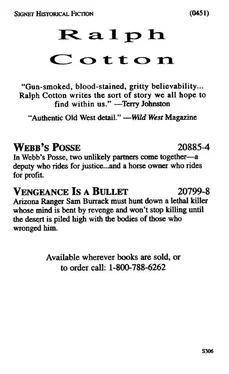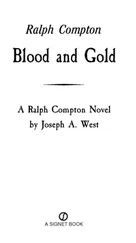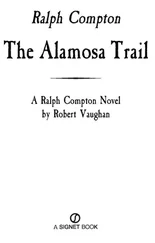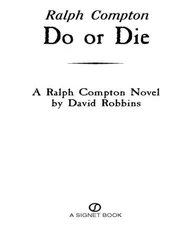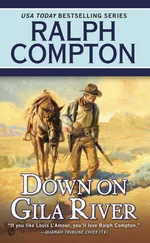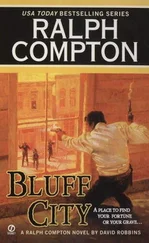Ralph Compton - Doomsday Rider
Здесь есть возможность читать онлайн «Ralph Compton - Doomsday Rider» весь текст электронной книги совершенно бесплатно (целиком полную версию без сокращений). В некоторых случаях можно слушать аудио, скачать через торрент в формате fb2 и присутствует краткое содержание. Год выпуска: 2015, Издательство: Penguin Publishing Group, Жанр: Старинная литература, на английском языке. Описание произведения, (предисловие) а так же отзывы посетителей доступны на портале библиотеки ЛибКат.
- Название:Doomsday Rider
- Автор:
- Издательство:Penguin Publishing Group
- Жанр:
- Год:2015
- ISBN:нет данных
- Рейтинг книги:5 / 5. Голосов: 1
-
Избранное:Добавить в избранное
- Отзывы:
-
Ваша оценка:
- 100
- 1
- 2
- 3
- 4
- 5
Doomsday Rider: краткое содержание, описание и аннотация
Предлагаем к чтению аннотацию, описание, краткое содержание или предисловие (зависит от того, что написал сам автор книги «Doomsday Rider»). Если вы не нашли необходимую информацию о книге — напишите в комментариях, мы постараемся отыскать её.
Doomsday Rider — читать онлайн бесплатно полную книгу (весь текст) целиком
Ниже представлен текст книги, разбитый по страницам. Система сохранения места последней прочитанной страницы, позволяет с удобством читать онлайн бесплатно книгу «Doomsday Rider», без необходимости каждый раз заново искать на чём Вы остановились. Поставьте закладку, и сможете в любой момент перейти на страницу, на которой закончили чтение.
Интервал:
Закладка:
The crowd, half-drunk and ready to cheer anybody, applauded wildly, and again Riley held up his hands for silence.
“To commemorate this auspicious occasion, the first visit to our city of any royalty, Russian or otherwise, I have the honor to present to you the famous tenor Mr. Francis Fitzhaugh, recently returned to us from Boston town, who will sing a ballad in honor of that illustrious couple.”
“Let’s hear it, Frank!” the younger gunman yelled, and his companion laughed and slapped him on the back.
Fitzhaugh was small and portly, a perfectly round belly protruding from the opening of his frockcoat. His hair was black, parted in the middle and slicked down on both sides with pomade, a carefully arranged kiss curl at each temple, and he sported a narrow mustache cultivated into points that stuck out on each side of his face.
Fussy and fastidious, the tenor was the kind of man who would cut quite a dash among the ladies, and indeed, the women in the saloon were regarding him with more than a passing interest.
“Ladies and gentlemen,” Fitzhaugh said, “this is a serenade to the count and countess and to all our Russian friends o’er the foam, as the poets say. The ballad is sung to the tune of ‘Old John Brown.’” The man turned to the piano player and gave a little bow. “Maestro, if you please.”
Fletcher was thoroughly enjoying this unexpected treat. He had a great affection for singers of all kinds, his own voice being so unlovely that during a brief stint as a puncher a few years back he was excused night hawk duty for fear his caterwauling would stampede the herd.
Now he took a step closer to the piano, eagerly anticipating the song as the pianist pounded out the opening chords with a deal more enthusiasm than skill.
Fitzhaugh clasped his hands together and laid them on the top of his round belly and in a fair, high tenor sang:
Mid the grandeur of the prairies, how can youthful Kansas vie
With her Russia-loving sisters, in a fitting welcome cry?
With her heart give full expression, and the answer echo high
The Czar and Grant are friends!
Ho! For Russia and the Union
Ho! For Russia and the Union
The Czar and Grant are friends!
There were other verses in the same vein, and after the song was over Fletcher applauded as loudly as the rest, and was even moved by Mr. Fitzhaugh’s touching rendition to give the man a resounding “Huzzah!”
As Fitzhaugh bowed his way through a door at the rear of the saloon, a bevy of squealing women chasing after him, it was Fletcher’s intention to call it a night and return to the hotel.
But then he looked around him and saw the trouble coming.
Later Fletcher would be unable to determine why he’d decided to stay where he was for a few minutes longer that night. Had it been mere curiosity? Or his gunfighter’s instinct telling him that he might have to get involved?
He would never find the answers to those questions, though many a time he would think about them, wondering.
During the singer’s performance, a tall, gawky farm boy in a homespun butternut shirt, bib-front overalls, and a threadbare wool coat three sizes too small for him had been talking and giggling with one of the saloon girls, spending his hard-earned money on beer for himself and “champagne” for her.
The younger of the two gunmen rose slowly to his feet, the menacing chime of his spurs on the rough pine floor and the purposeful way he walked hushing the people nearest him into an uneasy silence.
Riley saw it coming as clearly as Fletcher did. “Here,” he said, stepping to the edge of the bar, “we’ll have no trouble in here.”
“No trouble,” the gunman said. “All I want is this pumpkin roller to sing the song again. He spoiled it for me the first time with all his damn yakking.”
Now the entire crowd was quiet, waiting for what was to come, some faces concerned, others grinning and eager.
A man beside Fletcher, a freighter by the look of him, in a plaid shirt, his pants tucked inside mule-eared boots, leaned closer and whispered, “Now there’s going to be hell to pay. The farm boy is about to dance with the devil, because that there is Arkansas Jack Dunn, and the one with him is Will French.”
The names meant nothing to Fletcher. He’d known gunmen with local reputations as hard cases all over the West, and usually they amounted to nothing.
But even so, Dunn was more than a match for any farm boy. Dunn knew it and apparently so did the kid, a skinny youngster with big hands and wrists, no more than eighteen, freckles scattered over his cheekbones and nose.
The boy’s face was flushed, but whether from fear, beer, or anger, Fletcher could not guess.
“I don’t know the song,” the boy said, his voice unsteady. “An’ I never did learn how to sing except maybe a hymn or two.”
“Then you’d better learn real fast,” Dunn said. “I want to hear the song.”
“You heard the song, mister,” the boy said. “The man already done sung it oncet.”
Dunn smiled, a thin, hard grimace that didn’t reach his eyes. “Boy, I swear, you just called me a liar.”
The saloon girl, experienced in such matters, moved quickly away from the boy, as did the crowd around him. Now the kid was standing at the bar alone.
Fletcher turned to the freighter. “Where’s the town marshal?”
The man shook his head. “He ain’t here. He escorted the president’s wagons part of the way and he ain’t expected back until tomorrow. Maybe the day after that.”
The freighter looked Fletcher up and down, measuring him. “You thinking about taking a hand in this?”
“No,” Fletcher said. “It isn’t any of my business.”
The freighter nodded, dismissing him with a scathing, sidelong glance. “Jack Dunn is no bargain. All you’d do is get your fool self kilt.”
The railroad clock hanging on the saloon wall ticked loud in the silence; then Dunn said again, “Did you get my drift, boy? You called me a damned liar.”
The kid swallowed hard, his throat bobbing. “I didn’t mean to, mister. Honest I didn’t.”
Dunn shook his head. “It’s too late for that now.” He jutted a chin toward the boy. “When you call a man a liar, all you can do next is haul your iron and get to your work.”
“I don’t have a gun,” the kid said, looking around the room like a cornered animal, his eyes wild.
Fletcher knew the boy was desperately trying to find a way out of this situation. He’d walked into the saloon to drink beer and talk to a pretty girl, and now he was going to die—and for nothing.
“Somebody give this man a gun,” Dunn said, not taking his eyes off his victim.
One of the black troopers rose from his seat and stepped to the boy’s side. He unfastened the flap of his holster and laid his blue, long-barreled Colt on the bar.
“Take mine, kid,” he said with rough kindness. “She shoots true to the point of aim.”
“I ain’t never used a Colt’s gun before,” the boy said, looking down at the revolver as if it was a living thing that might rise up and bite him. “Had me a Kentucky squirrel rifle one time, but my folks never could get together twelve dollars for a Colt’s gun.”
“Well,” Dunn said, “you got one now, sodbuster. Pick it up.”
The boy knew he was trapped. He swallowed hard, and Fletcher saw him tense as he summoned his courage, determined, now that the chips were down and there was no way out, to die like a man.
Fletcher nodded his admiration. The final measure of any man, even one as young as this, is how well he acts when he stands on the threshold of eternity.
But with cold certainty Fletcher knew that as soon as the kid’s fingers touched the Colt, Dunn would draw and shoot him. And later he’d giggle and cut another notch on his gun handle or whatever tinhorn trick he used to keep count of his dead.
Читать дальшеИнтервал:
Закладка:
Похожие книги на «Doomsday Rider»
Представляем Вашему вниманию похожие книги на «Doomsday Rider» списком для выбора. Мы отобрали схожую по названию и смыслу литературу в надежде предоставить читателям больше вариантов отыскать новые, интересные, ещё непрочитанные произведения.
Обсуждение, отзывы о книге «Doomsday Rider» и просто собственные мнения читателей. Оставьте ваши комментарии, напишите, что Вы думаете о произведении, его смысле или главных героях. Укажите что конкретно понравилось, а что нет, и почему Вы так считаете.
